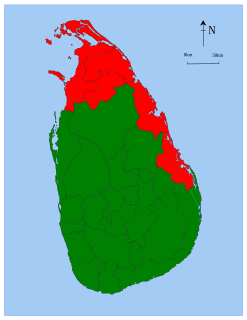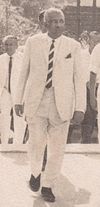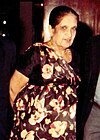The United National Front(UNF) later the United National Front for Good Governance(UNFGG) is a political alliance in Sri Lanka formed by the United National Party, the alliance currently represents 7 parties including the largest Muslim party Sri Lanka Muslim Congress and the Sinhala Nationalist Jathika Hela Urumaya. The UNF is current governing party in the Parliament of Sri Lanka. A new UNP led alliance, the National Democratic Front (NDF) is in the process of being formed for future elections.

General elections were held in Ceylon from 23 August to 20 September 1947. It was the first election overseen and administered by the newly-formed Department of Parliamentary Elections.

Ganapathipillai Gangaser Ponnambalam was a Ceylon Tamil lawyer, politician and cabinet minister. He was the founder and leader of the All Ceylon Tamil Congress (ACTC), first political party to represent the Ceylon Tamils.

The 1977 Sri Lankan election heralded the beginning of a new period of Sri Lanka's history - a period of unprecedented violence.

General elections were held in Ceylon in 1970.

General elections were held in Ceylon in 1956. They were a watershed in the country's political history, and was the first elections fought to challenge the ruling United National Party. The former Leader of the House, S.W.R.D. Bandaranaike who was passed over after the death of the first Prime Minister D.S. Senanayake, crossed over to the opposition to form the Sri Lanka Freedom Party to launch his bid for Prime Minister.

General elections were held in Ceylon in 1952. It is notable for being the second and final election overseen and administered by the Department of Parliamentary Elections before its merger in 1955.

General elections were held in Ceylon on 19 March 1960.

General elections were held in Ceylon in July 1960.
The Bandaranaike–Chelvanayakam Pact was an agreement signed between the Prime Minister of Sri Lanka S. W. R. D. Bandaranaike and the leader of the main Tamil political party in Sri Lanka S. J. V. Chelvanayakam on July 26, 1957. It advocated the creation of a series of regional councils in Sri Lanka as a means to giving a certain level of autonomy to the Tamil people of the country, and was intended to solve the communal disagreements that were occurring in the country at the time.

Alexander Perera Jayasuriya was Ceylonese politician. He was a former Minister of Health, Senator & Member of Parliament. He was one of the founders of the Sri Lanka Freedom Party.

The 1982 Sri Lankan national referendum took place on December 22, 1982, giving the people of Sri Lanka the option to extend the life of parliament by 6 years. It was the first and so far only national referendum to be held in Sri Lanka. The referendum was called for by President J. R. Jayawardene, who had been elected to a fresh six-year term as President in October 1982. With the life of the current parliament due to expire in August 1983, Jayawardene faced the possibility of his ruling United National Party losing its massive supermajority in parliament if regular general elections were held. He therefore proposed a referendum to extend the life of parliament, with its constituents unchanged, thereby permitting the United National Party to maintain its two-thirds parliamentary majority.
Chinnaiah Arulampalam was a Sri Lankan Tamil politician and Member of Parliament.
Arumugam Thiagarajah was a Sri Lankan Tamil teacher, politician and Member of Parliament.
The 8th Parliament of Sri Lanka was a meeting of the Parliament of Sri Lanka, with the membership determined by the results of the 1977 parliamentary election held on 21 July 1977. The United National Party won a 5/6 majority to form a government under J.R. Jayewardene. later Mr Jayawardane introduce a new constitution to Sri Lanka and was elected the 1st President of Sri Lanka. The government extended their term to stay in power in 1983 with out an election and stayed in power until 1989. The 1982 Sri Lankan national referendum took place on December 22, 1982, giving the people of Sri Lanka the option to extend the life of parliament by 6 years. It was the first and so far only national referendum to be held in Sri Lanka.[1] The referendum was called for by President J. R. Jayawardene, who had been elected to a fresh six-year term as President in October 1982. With the life of the current parliament due to expire in August 1983,

Shelton Ranaraja was a Sri Lankan lawyer, politician and deputy minister.

















